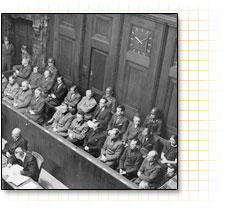Is It Ethical to Do an Intervention Study?
Human subjects are essential to research efforts to improve human health, but, no matter how lofty the goals of the research, it is not ethical to use people as a means to an end.

Nazi Experiments on Concentration Camp Prisoners During WW II
There have been many examples of unethical research, but world wide attention became focused on the experiments conducted by Nazi physicians during World War II. Experiments involving a wide variety of deadly, painful, and disfiguring procedures were conducted on thousands of concentration camp prisoners. In 1946, the War Crimes Tribunal at Nuremberg indicted 20 physicians and 3 administrators (photo to the right) for their willing participation in these experiments. The verdict at Nuremberg included ten directives for human experimentation that have become known as the Nuremberg Code:
|
The Nuremberg Code
|
The Declaration of Helsinki
The atrocities performed by physicians in the Nazi concentration camps prompted the World Medical Assembly to discuss guidelines for physicians engaged in medical research. Their ethics committee began considering this in 1953, but it wasn't until 1964 that the WMA adopted "Recommendations guiding physicians in biomedical research involving human subjects," at their 18th congress meeting in Helsinki, Finland. These guidelines have become known as the Declaration of Helsinki. These have been updated and revised a number of times.
Link to more on the World Medical Assembly
Link to more on the Declaration of Helsinki.


